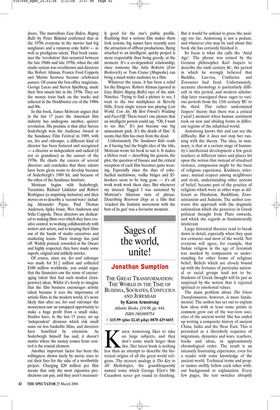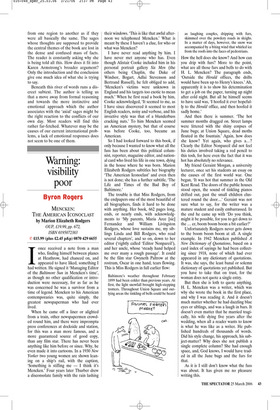Sages of the world, unite!
Jonathan Sumption
THE GREAT TRANSFORMATION: THE WORLD IN THE TIME OF BUDDHA, SOCRATES, CONFUCIUS AND JEREMIAH by Karen Armstrong Atlantic Books, £19.99, pp. 444, ISBN 1903809754 ✆ £15.99 (plus £2.45 p&p) 0870 429 6655 Karen Armstrong likes to take on large subjects, and they don’t come much larger than this. Her latest book is nothing less than an attempt to describe the historical origins of all the great world religions. The nearest analogy is The Key to All Mythologies, the grandiloquently named tome which George Eliot’s Mr Casaubon never got round to finishing. But it would be unkind to press the analogy too far. Armstrong is not a pedant, and whatever else may be said about this book she has certainly finished it.
Its focus is what she calls the ‘Axial Age’. The phrase was coined by the German philosopher Karl Jaspers to describe the sixth century BC, the period in which he wrongly believed that Buddha, Lao-tzu, Confucius and Zoroaster had lived. Unfortunately, accurate chronology is particularly difficult in this period, and modern scholarship later reassigned these sages to various periods from the 13th century BC to the third. This rather undermined Jaspers’ theory that there was a critical (‘axial’) moment when human sentiment took on new and abiding forms in different regions of the inhabited world.
Armstrong knows this and can see the difficulty. But it does not stop her running with the theory. The idea, in summary, is that at a certain stage of humanity’s intellectual development a few great teachers at different times and places hit upon the notion that instead of ritualised violence, compassion might be the basis of religious experience. Kindness, tolerance, mutual respect among neighbours and rivals, understanding other systems of belief, became part of the practice of religions which were in other ways as different as Hinduism, Buddhism, Zoroastrianism and Judaism. The author contrasts this approach with the dogmatic rationalism which she perceives in Greek political thought from Plato onwards, and which she regards as fundamentally intolerant.
Large historical theories tend to break down in detail, especially when they span ten centuries and most of the world. Not everyone will agree, for example, that Judaic religion in the age of Jeremiah was marked by compassion or understanding for other forms of religious belief. Beliefs which are closely bound up with the fortunes of particular national or racial groups tend not to be. Students of Greek thought will be just as surprised by the notion that it rejected spiritual or emotional values.
The main problem about The Great Transformation, however, is more fundamental. The author has set out to explain how ideas with at least some points in common grew out of the war-torn societies of the ancient world. She has ended up writing a composite history of ancient China, India and the Near East. This is presented as a disorderly sequence of migrations, dynasties and wars, teachers, books and ideas, in approximately chronological order. The result is an intensely frustrating experience, even for a reader with some knowledge of the ancient world. Technical terms and proper names swiftly follow each other without background or explanation. Every few pages, the text switches abruptly from one region to another as if they were all basically the same. The sages whose thoughts are supposed to provide the central themes of the book are lost in the dense and confused mass of facts. The reader is constantly asking why she is being told all this. How does it fit into Karen Armstrong’s broader argument? Only the introduction and the conclusion give one much idea of what she is trying to say.
Beneath this river of words runs a discreet subtext. The author is telling us that a move away from formal reasoning and towards the more instinctive and emotional approach which the author associates with the ‘axial’ sages might be the right reaction to the conflicts of our own day. Most readers will find this rather far-fetched. Whatever may be the causes of our current international problems, a lack of emotional responses does not seem to be one of them.
























































 Previous page
Previous page